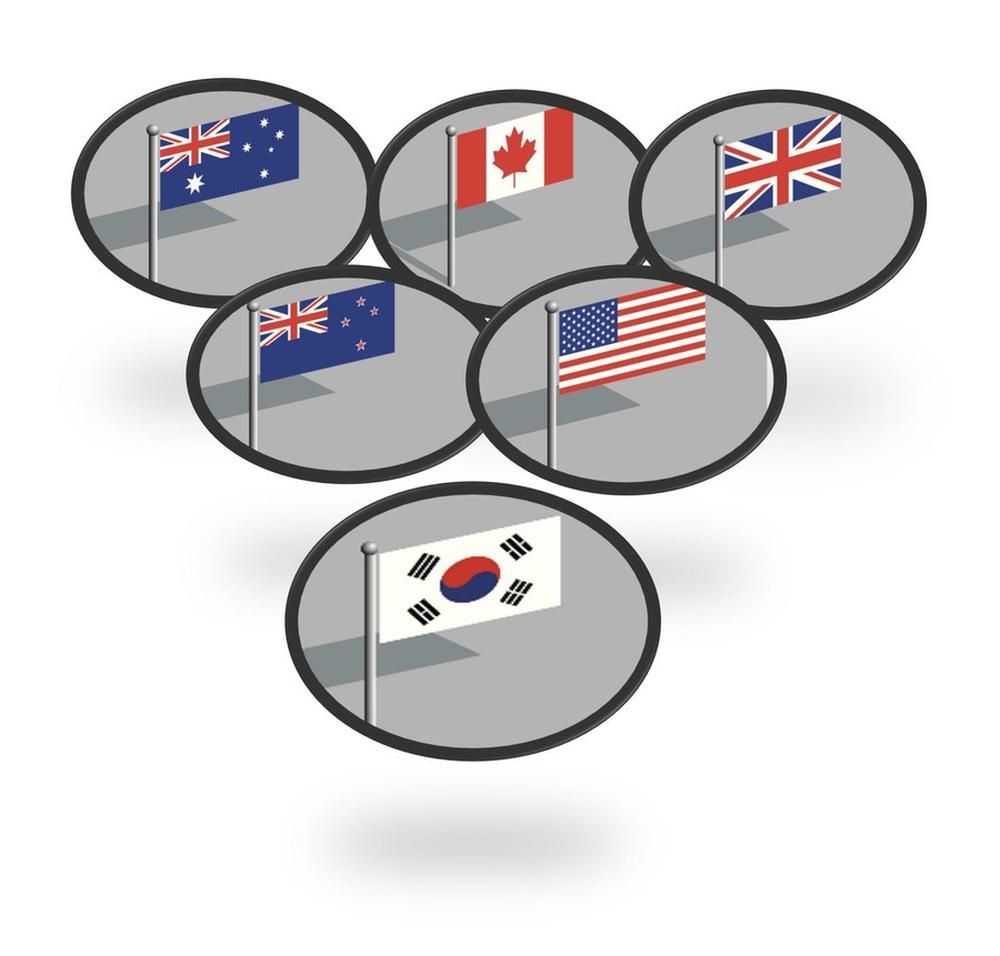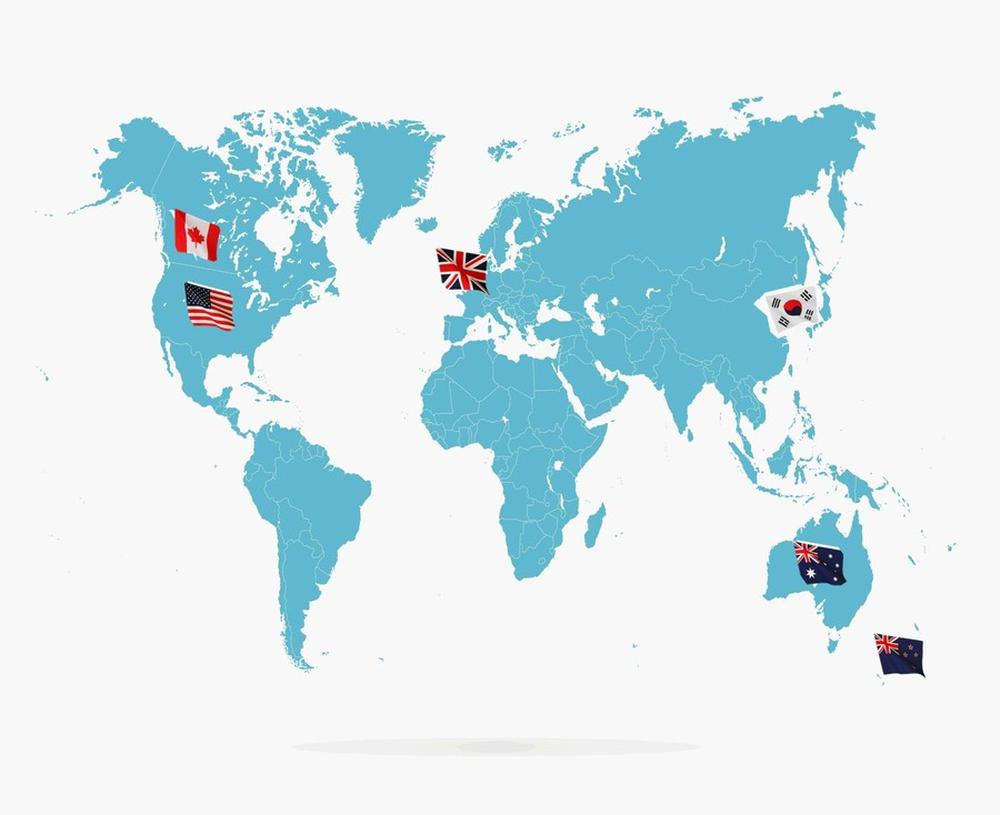- #Biden Administration
- #US-ROK
- #Alliance
- #QUAD
- #NATO
- #THAAD
- #Five Eyes
- #G7

► The Biden administration will most likely ask South Korea to join its 'Five Eyes' program.
► Given its security situation and national interests, joining the alliance is not a choice but rather a prestige and necessary step for South Korea.
Recently, the U.S. House Committee on Armed Services passed the 2022 National Defense Authorization Act. The bill recommended that the Biden Administration consider inviting four allies to the 'Five Eyes' intelligence alliance against China and Russia. These four countries are, not surprisingly, Japan, India, Germany and the Republic of Korea. Among them, Japan, India and ROK are America's key allies in Asia. Over many years, Japan and other allies have been considered as potential additions to the Five Eyes pact. As of now, the Five Eyes alliance includes the U.S., Canada, Australia, New Zealand and the U.K. — all of which are English-speaking Anglo Saxon 'family' countries. The Five Eyes pact originates from Western intelligence-sharing during the Second World War. Since then, the main threats to the U.S. have drastically changed, hence necessitating new strategies and partnerships. As such, Japan and India are now members of the Quadrilateral Security Dialogue (Quad) and partner with the U.S. in maintaining a free and open Indo-Pacific region against China's aggressive expansion. Likewise, Germany and the Republic of Korea are key allies of the U.S. in Europe and Asia against Russia and China.
The Biden Administration and Five Eyes Membership
Now, it is clear that the grand strategy of the Biden adminstration is to combine traditional allies in Europe, NATO countries in the Atlantic Ocean, and allies in the Asia Pacific aginst China and Russia. The new NATO 2030 initiative shows that the top concern of the US is first and foremost China, and to a lesser degree, Russia.[1] Moreover, the Interim National Security Strategic Guidance of the White House clearly delineates its friends and foes.[2] In this context, the main foreign policy of the Biden administration is not very different from the Trump administration. There are only three conspicious differences: whether the U.S. views allies as significant or not, whether the U.S. weighs on the significance of issues for international cooperation and institutions (such as climate change), and the rhetoric of the presidents. All three are fundamentally related to methodology and execution rather than content. Hence, it does make sense that the Obama, Trump and Biden administrations have all continued with the same foreign policy and strategic goals: a withdrawal from the Middle East that saved the lives of U.S. soldiers and a renewed focus on China. When President Biden decided to withdraw U.S. forces from Afghanistan, he purported that the U.S. needed to focus on four main threats: China, Russia, nuclear nonproliferation, and cyber. While China and Russia are regional issues, nuclear nonproliferation and cyber are themes (albeit nuclear nonproliferation and cyber also include the threats of China and Russia). Thus, it is not early nor surprising that the U.S. is considering inviting Japan, India, Germany, and the Republic of Korea to the Five Eyes intelligence sharing alliance. Though the U.S. House and Senate are both part of the government, it is expected that they will voice the same opinion regarding this issue. Likewise, it is unlikely that this issue will receive bipartisan support as, unsurprisingly so, there are no openly pro-Chinese or pro-Russian politicians in the U.S. In this context, the U.S. government will most likely ask the Republic of Korea to officially join the Five Eyes program. This is a wholly different issue from the QUAD. So, what should the Korean government do about this?
Benefits and Costs?
What will be benefits and costs if the ROK government joins Five Eyes? Although this is somewhat similar to the issue of joining the QUAD, there are more technical and functional issues to consider. The Five Eyes countries do not include Asian allies but only the 'family' states of America: the U.K., Australia, Canada and New Zealand. These five countries are founded upon the same Anglo Saxon blood: thus, the status and historical background of the members of Five Eyes are quite different from those of the QUAD. Recently, issues regarding AUKUS and France's anger towards such problems indicate that blood is thicker than water. It is true that geopolitical situations, economic interests, and other considerations are important factors in foreign policy decision making. However, according to Constructivist theories, irrational factors such as emotion, anger, humiliation, fear, psychological factors and memories are more important than rational factors in international politics. We are all human beings. Many people wonder why half of the South Korean public support the Sunshine policy and Korean Peninsula Peace Process or why South Korea have historically not resorted to military responses to North Korea provocations. This is because while South Koreans do worry about the possibility of war, at the same time, North Korea is not just an enemy to South Korea. Fundamentally, the two Koreas are cut from the same cloth and potential unification partners. Though membership to the Five Eyes club was originally only open to nations similar to the U.S., it now wants to invite non-English speaking, non-Anglo Saxon allies. This indicates that the U.S. has realized that it needs more combined efforts against Chinese expansion, given that China will be a serious political, economic, military, and psychological threat to the U.S. for at least the next few decades regardless of whether the Democrats or GOP take the White House. The Soviet Union has been seven decades number one enemy. In this situation, the Republic of Korea need not calculate the costs and benefits of it joining Five Eyes. The answer is obvious: we must join the club. The only question is when and how. Naturally, the Chinese reaction will be the costs we must suffer. Unfortunately so, ROK is too close to China and China is too strong of a neighbor. Thus, in order for Korea to survive, it must have a stronger ROK-US alliance and learn from top class elites club such as the G7, OECD, and Five Eyes. According to many surveys, the top foreign policy goal for all South Korean people is a stronger ROK-US alliance. Though South Korea possesses robust self defense capablilities, in the security realm, stronger is always better. For the Republic of Korea, joining the Five Eyes club is not a choice but rather a prestige that sends a clear diplomatic message to the world: that the Republic of Korea is a best friend to the U.S. and its allies. Democracy, free market economy, human rights, and liberal internationalism are all values that the Republic of Korea has to defend with such allies.
The Five Eyes: Not a Choice, But a Prestige
The origins of the ROK-U.S. alliance is special in that it entails blood friendship. Korea is not an English-speaking Anglo Saxon nation; yet, Korean people are best friends of American people and vice versa. The ROK-U.S. strategic partnership has evolved so that it is no longer merely a traditional miltary alliance against potential North Korean invasions. Now, the alliance embarks upon a new chapter, with the most recent Presidential Summit between Moon and Biden being a turning point. The ROK-U.S. strategic alliance is now at a global stage and the two nations must now work to share and defend common values such as democracy, free market economy, and human rights. Our relationship is now akin to the U.S.'s special relationships with the U.K., Japan, and Israel. South Korea and the U.S. may not be biologically similar, but culturally and emotionally, the two are family in that they share the same values and strategic security goals. In this sense, for the Republic of Korea, joining Five Eyes is not a choice but a necessary step in strengthening relations with the U.S.
[1] NATO, NATO 2030: United for a New Era. 25 November 2020. https://www.nato.int/nato_static_fl2014/assets/pdf/2020/12/pdf/201201-Reflection-Group-Final-Report-Uni.pdf
[2] The White House, Interim National Security Strategic Guidance. March. 2021.
Youngjun Kim is a Professor of National Security College of the Korea National Defense University. He is a member of the National Security Advisory Board for the Republic of Korea President's Office and a Central Committee Member of the Peaceful Unification Advisory Board Council. Dr. Kim is currently a director of the Center for Northeast Asian Affairs and the Center of North Korean Affairs at the Research Institute of National Security Affairs. His recent book is Origins of the North Korean Garrison State : The People's Army and the Korean War at Routledge.

